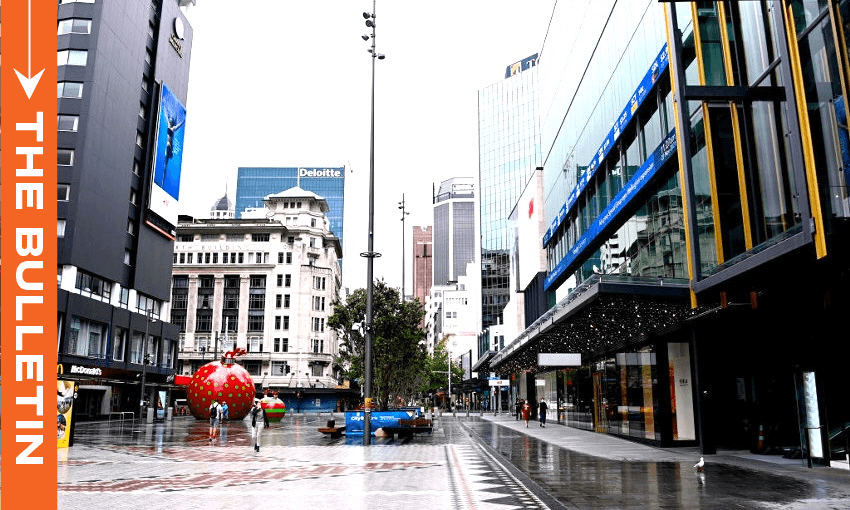Business owners and their customers say central Auckland feels increasingly unsafe and uninviting – and are arguing that coordinated action is needed now, writes Catherine McGregor in today’s extract from The Bulletin.
To receive The Bulletin in full each weekday, sign up here.
Aucklanders voice their anger over the state of CBD
Two recent surveys – one formal, one very much not – have laid bare the depth of frustration over antisocial behaviour in Auckland’s city centre. The business group Heart of the City (HOTC) surveyed 102 operators in and around Queen Street and found 91% thought rough sleeping and begging were harming their trade, while 81% believed the CBD was unfit to attract new people and investment. A companion poll on the Herald’s website, though opt-in and therefore highly unscientific, drew more than 6100 responses, 97% of whom agreed the central city had become “uninviting” and “beset by anti-social behaviour”.
Business owners described daily scenes of drug use, street fights and even public sex. “It’s very intimidating for normal people,” said cafe owner Paul Ewing, adding security come to his premises “three, four, five times a day”. One office executive told the Herald’s Tom Dillane staff had been assaulted in broad daylight, while a suburban foodie said she and her husband no longer frequent CBD restaurants in part due to once-lively dining streets now reeking of vomit and excrement.
Measures in motion but patience wearing thin
A number of safety measures are already in place, including a reinstated 24-hour police base on Federal Street, Auckland Council compliance wardens, and HOTC’s own round-the-clock security patrols. In March, the government also allocated $1.3 million from its Proceeds of Crime Fund to install lighting, CCTV and more patrols across central Auckland, including the CBD.
HOTC chief executive Viv Beck says her group’s long-standing call for a coordinated response is finally being heard, with ministers agreeing a cross-agency approach is needed. But, she adds, “we’re stressing the urgency” for visible progress before the City Rail Link and new convention centre open in 2026. She tells The Post’s Amelia Wade (paywalled) HOTC wants immediate enforcement of bylaws and a “crackdown on drugs” so visitors and locals feel safe again. “What we’d really like to see is people in need get the help they need – and businesses have a really good environment to trade in.”
Tightened housing rules fuel a wider crisis
While more police and security might curb some antisocial behaviour, those working with homeless Aucklanders say the problem’s roots lie in government policy. As RNZ’s Lauren Crimp reports, rule changes introduced in August 2024 made it far harder to enter or remain in emergency housing, requiring extensive proof of eligibility and allowing officials to decline people deemed to have “caused or contributed” to their homelessness.
Both applications and approvals have since plummeted, with more applications now being declined than granted in Auckland. In early September, ministers instructed officials to use more discretion in applying the rules – but stopped short of officially relaxing them. Housing advocates say the impact has already been devastating: the number of people living without shelter in Auckland has almost doubled this year and more than 500 nationwide are now sleeping in cars, according to a report in The Post last month. “They’ve just shut the door and left some of our most vulnerable people out in the cold,” youth worker Aaron Hendry told the Herald’s Julia Gabel (paywalled). The government insists its “tighter gateway” restores personal responsibility, but critics argue it has simply shifted the problem onto city streets.
More long-term social housing needed
Experts say the answer to Auckland’s worsening street crisis lies not in tougher policing but in proven, long-term housing strategies. In an op-ed for The Post (paywalled), Rami Alrudaini of Housing First Auckland argues the situation in Auckland “isn’t a failure of enforcement. It’s a failure to implement what works.” The Housing First model provides people experiencing chronic homelessness with permanent housing first, then wraps intensive support around them, from addiction services and mental health care to employment assistance. Alrudaini says local data shows about 90% of participants remain housed after six months.
Following mounting pressure, the government has announced 300 new social homes through the Housing First programme and extra funding for rough-sleeper services. But Labour housing spokesperson Kieran McAnulty says the move “won’t even touch the sides” of the crisis, and Auckland City Mission points out that only those who have been homeless for at least a year qualify for Housing First support, leaving many rough sleepers out in the cold – quite literally.
Subscribe to +Subscribe

